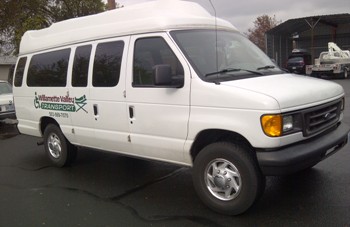Feb 26 2013
Medical transit service Willamette Valley Transport expects to save around $18,000 annually on fuel costs and significantly reduce greenhouse gas emissions with five new propane autogas vans. Blue Star Gas is helping the Pacific Northwest fleet switch to autogas through a complete program of vehicle conversions, clean fueling, training and ongoing support.

Willamette Valley Transport vans travel between 25,000-30,000 miles each year, serving Marion, Polk and Yamhill counties in Oregon. Owner Timothy McClain is in the process of updating his fleet with newer vehicles, converting each new model to propane autogas as he purchases them. He plans to switch a total of 10 vans to autogas, and so far has converted two Ford E-250s and three Chevy Express 3500s.
“Our customers depend on us for reliable service for their medical transportation needs, so we wanted a fuel that offered high performance at a lower cost than gasoline,” says McClain. “Switching vans to propane autogas with the help of Blue Star Gas has been a great experience. We’re already reducing our fuel costs by running on autogas instead of gasoline, and expect even greater savings as we convert more fleet vehicles to this clean fuel.”
The fleet will also recoup 50-cents-per-gallon thanks to the recently extended federal alternative fuel tax credit, which will save them an additional $8,400 for five propane-powered vehicles. Once all 10 vehicles are up and running on autogas, WVT will save an estimated $36,000 annually on fuel costs and an extra $16,800 with the tax credit.
As part of Alliance AutoGas, Blue Star Gas provides West Coast fleets from California to Seattle with the only complete program to switch to propane autogas. In addition to coordinating vehicle conversions and supplying fuel for WVT, Blue Star Gas installed an on-site autogas fuel station at their home base for convenient refueling. The company just opened a public autogas fueling location adjacent to the Portland airport to provide fuel for WVT’s northern fleet, as well as other fleets in the area, and WVT vans can also refuel at public Blue Star Gas stations in Salem and McMinnville.
“Propane autogas is the most viable fuel for fleets because it’s clean, it’s cheaper than gasoline and it’s much more affordable to get up and running on autogas versus other alternative fuels,” says Blue Star Gas autogas fleet specialist Dave Brazil. “Vehicle conversion financing available through Alliance AutoGas enables new autogas fleets to start saving right away, since fuel cost savings often outweigh monthly payments.”
Autogas fleets currently save around $1.75 per gallon on fuel costs versus gasoline; and, because propane autogas is 30 percent cleaner, many fleets report reduced maintenance needs and even increased engine life. Autogas is the most widely used alternative fuel in the world, and 98 percent of the U.S. supply is made in America.
Willamette Valley Transport serves patients who need wheelchair and non emergency stretcher transportation, utilizing specially equipped vehicles outfitted with wheelchair lifts and wheelchair securement stations inside. Drivers can help patients in and out of their homes for doctors’ office visits, transport them home from the hospital, check patients into their medical appointments, and schedule a return ride or remain with a patient at their appointment when requested. Visit www.wvtransport.com for more information.
“Our drivers and customers alike enjoy the new propane-powered vans, and we’re happy to know we’re helping improve the air quality in our local community by using an American-made clean fuel,” says McClain. “I am also excited about the improvements to our company's bottom line, and I highly recommend other fleets with similar vehicles convert as soon as they can.”